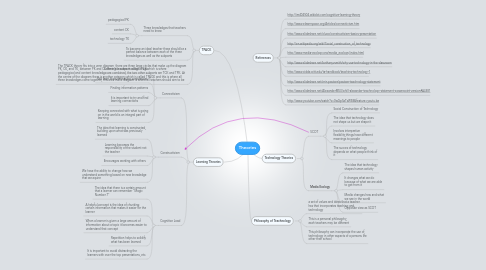
1. Learning Theories
1.1. Connectivism
1.1.1. Learning theories in a digital age
1.1.2. We learn through making connections
1.1.3. Finding information patterns
1.1.4. It is important to try and find learning connections
1.1.5. Keeping connected with what is going on in the world is an integral part of learning
1.2. Constructivism
1.2.1. The idea that learning is constructed, building upon what was previously learned
1.2.2. Learning becomes the responsibility of the student not the teacher
1.2.3. Encourages working with others
1.2.4. We have the ability to change how we understand something based on new knowledge that we aquire
1.3. Cognitive Load
1.3.1. The idea that there is a certain amount that a learner can remember "Magic Number 7"
1.3.2. A helpful concept is the idea of chunking certain information that makes it easier for the learner
1.3.3. When a learner is given a large amount of information about a topic it becomes easier to understand that concept
1.3.4. Repetition helps to solidify what has been learned
1.3.5. It is important to avoid distracting the learners with over the top presentations, etc.
2. TPACK
2.1. Three knowledges that teachers need to know
2.1.1. pedagogical PK
2.1.2. content CK
2.1.3. technology TK
2.2. To become an ideal teacher there should be a perfect balance between each of the three knowledges as well as the subparts
2.3. The TPACK theory fits into a venn diagram, there are three large circles that make up the diagram PK, CK, and TK, between PK and CK there is a subpart called PCK which is where pedagogical and content knowledge are combined, the two other subparts are TCK and TPK. At the centre of the diagram there is another category which is called TPACK and this is where all three knowledges come together, this area in the diagram is where all teachers should aim to be
3. References
3.1. http://im404504.wikidot.com/cognitive-learning-theory
3.2. http://www.elearnspace.org/Articles/connectivism.htm
3.3. http://www.slideshare.net/olupo/constructivism-basics-presentation
3.4. http://en.wikipedia.org/wiki/Social_construction_of_technology
3.5. http://www.media-ecology.org/media_ecology/index.html
3.6. http://www.slideshare.net/bethanyvsmith/why-use-technology-in-the-classroom
3.7. http://www.cidde.pitt.edu/ta-handbook/teaching-technology-1
3.8. http://www.slideshare.net/erin.pastore/pastore-teachnology-statement
3.9. http://www.slideshare.net/AlexanderMSU/phill-alexander-teachnology-statement-powerpoint-version#AL881
3.10. http://www.youtube.com/watch?v=0wGpSaTzW58&feature=youtu.be
4. Technology Theories
4.1. SCOT
4.1.1. Social Construction of Technology
4.1.2. The idea that technology does not shape us but we shape it
4.1.3. Involves interpretive flexibility,things have different meanings to people
4.1.4. The succes of technology depends on what people think of it
4.2. Media Ecology
4.2.1. The idea that technology shapes human activity
4.2.2. It changes what we do because of what we are able to get from it
4.2.3. Media changes how and what we see in the world
4.2.4. Opposite view as SCOT
